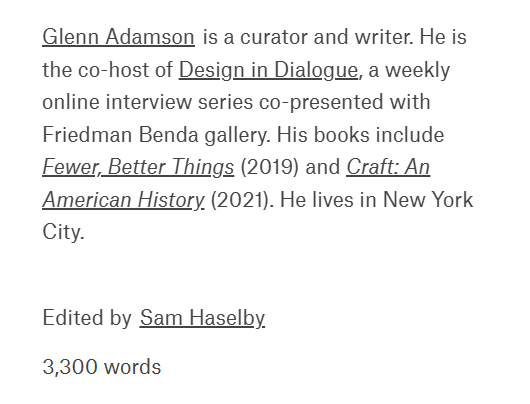Welcome to DU!
The truly grassroots left-of-center political community where regular people, not algorithms, drive the discussions and set the standards.
Join the community:
Create a free account
Support DU (and get rid of ads!):
Become a Star Member
Latest Breaking News
Editorials & Other Articles
General Discussion
The DU Lounge
All Forums
Issue Forums
Culture Forums
Alliance Forums
Region Forums
Support Forums
Help & Search
Material intelligence

The chasm between producers and consumers leaves many of us estranged from beauty and a vital part of an ethical life
https://aeon.co/essays/do-you-know-your-stuff-the-ethics-of-the-material-world

At work in the workshop of a blacksmith in Klitten, Germany, 2018. Photo by Florian Gaertner/Photothek via Getty Images

Are you sitting comfortably? If so, how much do you know about the chair that’s holding you off the ground – what it’s made from, and what its production process looked like? Where it was made, and by whom? Or go deeper: how were the materials used to make the chair extracted from the planet? Most people will find it difficult to answer these basic questions. The object cradling your body remains, in many ways, mysterious to you. Quite probably, you are surrounded by many things of which you know next to nothing – among them, the device on which you are reading these words. Most of us live in a state of general ignorance about our physical surroundings. It’s not our fault; centuries of technological sophistication and global commerce have distanced most of us from making physical things, and even from seeing or knowing how they are made. But the slow and pervasive separation of people from knowledge of the material world brings with it a serious problem.
Until about a century ago, most people knew a great deal about their immediate material world. Fewer and fewer do today, as commodities circulate with ever greater speed over greater distances. Because of the sheer complexity of contemporary production, even the people who do have professional responsibility for making things – the engineers and factory workers and chemists among us – tend to be specialists. Deepened knowledge usually also means narrowed knowledge. This tends to obscure awareness of the extended production chains through which materials, tools, components and packaging are sourced. Nobody – not an assembly-line worker, not a CEO – has a comprehensive vantage point. It is partly a problem of scale: the wider the view comes, the harder it is to see clearly what’s close at hand.
In effect, we are living in a state of perpetual remote control. As Carl Miller argues in his book The Death of the Gods (2018), algorithms have taken over many day-to-day procedures. These algorithms are themselves driven by algorithms, in a cascade of interconnected calculation. Such automated decisionmaking is extremely efficient, but it has contributed to a crisis of accountability. If no one understands what is really happening, how can anyone be held responsible? This lack of transparency gives rise to a range of ethical dilemmas, chief among them our inability to address climate change, due in part to prevalent psychological separation from the processes of extraction, manufacture and disposal. For the same reasons, corporations take little responsibility for their outsourced workers. Scale and distance present consumers with related challenges: if you don’t know the people who were responsible for making the things in your life (and indeed, cannot imagine what their own lives might be like), it is difficult to find common cause with them. This gap between producers and consumers leads to a crack in the social fabric, where weeds of distrust and hatred can grow. Like any tool, technology in itself is not a bad thing. But the more we trust it to be the binding agent for our society, the more fragmented we seem to become.
So what can be done about it? I have a modest proposal: let’s cultivate our material intelligence. Let’s try to recover our literacy in the ways of the physical world, just as someone who reads English can understand this sentence, and someone good with numbers can draw up a balanced budget. If we can anchor ourselves in this way, attending closely to the objects near to us, we might just be able to regain our bearings, and take greater responsibility for our actions.